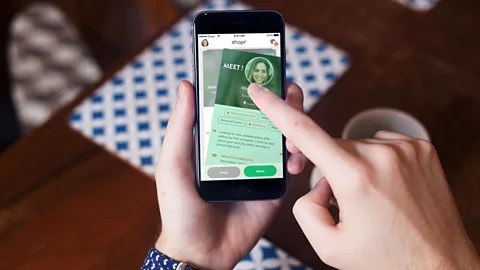Looking for your dream job? Swipe right
 iStock / Getty Images Plus
iStock / Getty Images PlusFor a generation used to swiping right for love, these networking apps are a natural fit.
It can be tough moving cities and finding work. So Katherine Hogan, 24, a graduate student in Boston who is relocating to New York, is using all the tools at her disposal. She’s signed up for Shapr, a networking app, after seeing an advertisement on Instagram.
“The primary reason I joined is because I’m moving to New York and I know it’ll be tough to find a job immediately,” she says. “I put the option of saying I’m new in town and looking for opportunities.”
 Shapr
ShaprIt’s well-known that expanding your network can pay dividends. But if you take your job search to social media – particularly if it’s modelled after dating apps that, with a single swipe, links you to new connections – it could lead to even more opportunities. (Professional ones, that is.)
Adam Kleinbaum is an expert in social network structures at the Tuck School of Business at Dartmouth University in New Hampshire. He says research shows that people with diverse and far-reaching networks get promoted faster and evaluated more favourably.
“In some industries, they even get bigger bonuses,” says the associate professor of business administration. But it’s also no secret that traditional networking methods – drinks after work or schmoozing over cocktails – can conjure negative images for some.
Now, however, a host of new apps based on the successful design of dating apps are trying to change the way we network.
Earlier this year Tinder unveiled a new app called Ripple, where users can swipe right to be connected to like-minded professionals they might then meet in real life. Bumble Bizz, which launched last year, works in much the same way, but with a twist that aims to empower women: while there are male users on the site, the female users have to reach out first to make a connection.
And Shapr, which was created by the entrepreneur behind a popular French dating site, has been around in its current form since 2016.
The app, which limits the number of swipes users can do per day with the aim of establishing quality connections over quantity, has a million users. There were 100,000 sign-ups in February alone, according to head of PR and brand development Mandy Menaker.
She says 72% of users come from the US, UK and Canada combined.
 Laura DeCapua
Laura DeCapuaGreg Frank, 25, is the founder of Canadian start-up E2 Adventures, an educational non-profit organisation. He signed up to Shapr after his step-brother used it to arrange a meeting with the CFO of one of Canada’s largest banks.
“They both swiped right,” said Frank. “And I thought: ‘Wait, you’re not meeting Tinder-quality people here’. I realised it would be a great networking opportunity for me.” Frank has been using Shapr for four months and estimates he has met 15 to 20 people.
Because his start-up involves organising field trips to factories, he uses the app to meet people across various industries to learn more about them.
“Recently I swiped right with someone who works in pharmaceuticals and we chatted for a few days before meeting up in a café, and it was a lot of fun,” he said. “She explained how her industry works and by the end invited me to visit her factory this summer.”
Frank says he hopes to organise a trip to the factory for his non-profit in the future.
Kleinbaum, who uses Shapr, says the move towards these apps shows people are realising they need to diversify their networks.
“When people’s networks are overly concentrated in the same industry, job function, or ways of thinking, it’s easy to get sucked into echo chambers in which we’re insulated from new perspectives,” he said. “Broadening your network is a really good way to break out of echo chambers and bring cognitive diversity to your projects.”
For the same reason, just relying on your network of friends on Facebook (however large) isn’t as good as actively seeking out diverse people professionally.
“The basic processes by which people build their social networks tend to lead to networks that are cohesive and filled with people who are a lot like ourselves. And there are a lot of dangers professionally and perhaps personally, to being in a network so insulated from different modes of thinking,” Kleinbaum said.
He recommends against setting specific criteria that will narrow the people that apps like Shapr will expose you to. “Focus on something that would make the contacts valuable. But also recognise that there’s value in interacting with people who are coming at things from a totally different perspective,” he said.
Frank cautions against coming on too strong. “Once I met a guy who really just wanted a job and was telling me: ‘I love what you do and I want to work with you and here are all the things I care about.’
“It’s a good thing in a way because it allows job-seekers to get out in the real world and not [get] stuck in an HR setting, but it was an awkward interaction because it was kind of like walking up to a stranger and asking them to get married.”
But Frank also suggests being direct with new people and offering to meet more quickly than you would on a dating site to avoid the other party losing interest. And since it’s not a dating or friendship app, it’s perfectly fine to set up a call or web chat rather than meet in person.
Hogan, who says she was sceptical of the app at first, says she was pleasantly surprised at how direct her first contact was about setting up a phone call.
“Networking can be intimidating. But I’m challenging myself to not be caught off guard—I’d rather hop on a call and really learn from another person rather than just messaging back and forth.”
--
To comment on this story or anything else you have seen on BBC Capital, please head over to our Facebook page or message us on Twitter.
If you liked this story, sign up for the weekly bbc.com features newsletter called "If You Only Read 6 Things This Week". A handpicked selection of stories from BBC Future, Culture, Capital and Travel, delivered to your inbox every Friday.
{"image":{"pid":""}}
